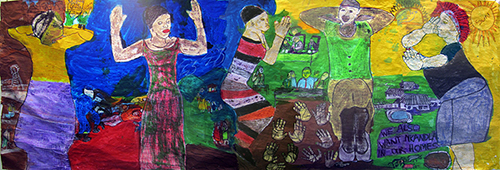Latest News Archive
Please select Category, Year, and then Month to display items
05 June 2018
Photo Supplied
 Archaeological excavations in the Wonderwerk Cave, north of Kuruman in the Northern Cape.
Archaeological excavations in the Wonderwerk Cave, north of Kuruman in the Northern Cape.
Research fellow Dr Lloyd Rossouw from the Department of Plant Sciences at the University of the Free State (UFS) recently published an article in the Nature Ecology and Evolution journal with Dr Michaela Ecker from the University of Toronto as lead author, and Dr James Brink, research fellow at the UFS Centre for Environmental Management. The findings described in “The palaeoecological context of the Oldowan-Acheulean in southern Africa” provides the first extensive paleoenvironmental sequence for the interior of southern Africa by applying a combination of methods for environmental reconstruction at Wonderwerk Cave, which have yielded multiple evidence of early human occupation dating back almost two million years ago.
Where water once was
The Wonderwerk Cave is found north of the Kuruman hills (situated in Northern Cape) a 140m long tube with a low ceiling. The surroundings are harsh. Semi-arid conditions allow for the survival of only hardy bushes, trees, and grasses. But during the Early Pleistocene, stepping out of the Wonderwerk Cave you would have been greeted by a completely different site, the researchers found. Using carbon and oxygen stable isotope analysis on the teeth of herbivores (Dr Ecker), fossil faunal abundance (Dr Brink), as well as the analysis of microscopic plant silica remains (phytoliths) excavated from fossil soils inside the cave (Dr Rossouw), the results show that ancient environments in the central interior of southern Africa were significantly wetter and housed a plant community unlike any other in the modern African savanna.
What difference does it make?
While East African research shows increasing aridity and the spread of summer-rainfall grasslands more than a million years ago, the results from this study indicate an interesting twist. During the same period, shifts in rainfall seasonality allowed for alternating summer and winter-rainfall grass occurrences coupled with prolonged wetlands, that remained major components of Early Pleistocene (more or less the period between one and two million years ago) environments in the central interior of southern Africa. That means our human ancestors were also living and evolving in environments other than the generally accepted open, arid grassland model.
Panel to discuss: 'Speaking wounds: voices of Marikana widows through art and narrative' on Monday 27 July 2015
2015-07-24
The massacre of 34 mine workers at Marikana on 16 August 2012 had South Africans in uproar. But what remained, after the razor wire was rolled up and the camera crews left, were 34 widows engulfed in silent despair. That was until the Khulumani Support Group introduced them to the transformative power of art and storytelling. In the last installment of the Vice-Chancellor’s Lecture Series for this year, a panel of speakers will discuss these widows’ journey with the theme of ‘Speaking wounds: voices of Marikana widows through art and narrative’.
Panel
The panel will consist of members from the Khulumani Support Group that include Dr Marjorie Jobson (National Director), Nomarussia Bonase (National Organiser), and Judy Seidman (Sociologist and Graphic Artist). Nomfundo Walaza, who is the former CEO of the Desmond Tutu Peace Centre, will be the respondent.
Details of the event:
Date: Monday 27 July 2015
Time: 12:00
Venue: Chancellor's Room, Centenary Complex, Bloemfontein Campus
RSVP: Nomusa Mthethwa at Nomusam@ufs.ac.za (Members of the public are welcome to attend.)
Body maps
An art exhibition consisting of body maps created by the widows will also be on display. These paintings quietly portray the turmoil of their inner landscapes, their perceptions of the massacre, and the impact these events had on their lives.

Collaboration
The lecture series is hosted by Prof Pumla Gobodo-Madikizela, Senior Research Professor in Trauma, Forgiveness, and Reconciliation Studies at the University of the Free State (UFS), as part of a five-year research project funded by the Andrew W. Mellon Foundation. This installment of the lecture series is presented in collaboration with the UFS Institute for Reconciliation and Social Justice.